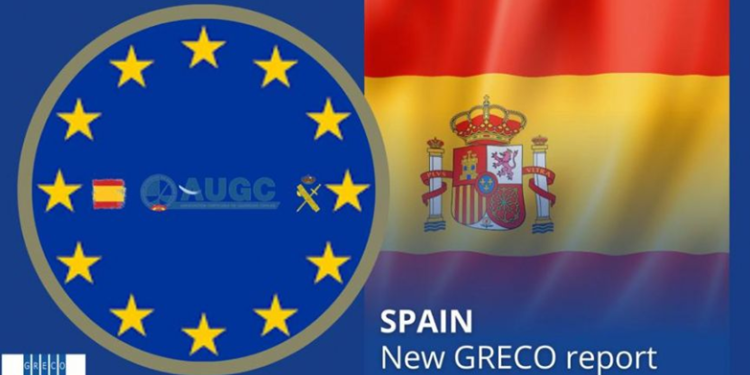News from AUGC (Spain)
- AUGC persuades GRECO to rule on the lack of transparency in the Civil Guard’s appointments. Concern over the persistence of discretionary appointments in the Civil Guard following the GRECO report (5th Round, December 2023)
The Council of Europe’s Group of States against Corruption (GRECO) is an international body responsible for overseeing the fight against corruption in its member states. Its functions include periodically evaluating national policies and institutions, issuing recommendations, and assessing their implementation.
GRECO Report – 5th Evaluation Round (December 2023)
In its recent report, GRECO has once again focused on the Civil Guard and the National Police, evaluating aspects such as the selection, promotion, and discretionary appointment systems within both institutions.
Point XV of its recommendations proposed a thorough review of internal career processes, with the aim of increasing transparency and objectivity in decision-making, especially in non-public appointments (free appointment, service commissions, etc.). It also highlighted the importance of advancing the integration of women at all hierarchical levels.
The December 2023 report recognizes certain progress, especially in the area of gender equality and the creation of regulations (such as General Order 3/2023 of the Civil Guard) that better define merit and competency criteria.
However, GRECO warns that these improvements are insufficient and expresses concern about the growing number of discretionary appointments and secondments without publicity or competitive bidding. These mechanisms (when not properly regulated) open the door to clientelism, favoritism, and a lack of objective motivation in decisions, which undermines the confidence of staff and citizens.
From the Unified Association of Civil Guards (AUGC) we have been denouncing this situation for years. In our letter addressed to GRECO (June 2022), we clearly exposed how the abuse of handpicked appointments, the proliferation of “ghost units” and uncontrolled prolonged secondments are generating an opaque system far from the principles of equality, merit and capacity.
Our complaint was not unfounded. In 2020, Congress itself acknowledged that there were 7,091 freely appointed positions in the Civil Guard, compared to 2,883 in the National Police. In 2022, the figure rose to 10,600, according to official data. Many of these positions are filled by low-ranking officers, without public competition or transparency.
Therefore, the GRECO report reaffirms that the recommendation remains partially fulfilled. From AUGC we demand that the Ministry of the Interior and the Directorate General of the Civil Guard take on board the warnings of GRECO and progressively eliminate arbitrary appointments, replacing them with objective, public and auditable processes.
Original Spanish version on the AUGC website.
- AUGC demands an explanation from the PSOE in Europe for trying to prevent MEPs from meeting with the widows of Civil Guards murdered in Barbate.
 The Unified Association of Civil Guards expresses its deep indignation at the attempt to veto a key meeting to understand the human impact of drug trafficking in the Strait of Gibraltar.
The Unified Association of Civil Guards expresses its deep indignation at the attempt to veto a key meeting to understand the human impact of drug trafficking in the Strait of Gibraltar.
AUGC has sent a formal letter to the Socialist Party delegation in the European Parliament requesting urgent explanations regarding the attempt to prevent the European parliamentary mission, which will soon visit the Strait of Gibraltar, from meeting with the widows of Civil Guard officers Miguel Ángel and David, who were murdered in the line of duty in the port of Barbat (Cádiz) on February 9, 2024.
At AUGC, we believe that refusing to hear the families’ testimony and preventing MEPs from gaining a true picture of the situation in the region demonstrates a lack of sensitivity and respect for the memory of our deceased colleagues and the suffering of their loved ones.
It’s worth remembering that the European Parliament’s mission aims to analyze the impact of drug trafficking and the harsh working conditions faced by police officers in one of the most dangerous areas of the country. Therefore, we find it incomprehensible and insensitive that they would try to exclude from the agenda a meeting with the families of the victims, whose experience represents the most tragic and human side of this struggle.
Furthermore, AUGC has requested a direct meeting with the European Parliament committee that will visit the Strait of Gibraltar area in the coming days. This will provide a first-hand account of the reality experienced by Civil Guards stationed in this territory, as well as provide our perspective on the urgent needs regarding security, resources, and working conditions.
For all these reasons, we at AUGC have written to the Socialist representatives for a clear and detailed explanation of the reasons that led to this attempted veto, and we demand an immediate response for the dignity of our deceased colleagues, respect for their families, and the transparency of the work of the European institutions.
Original Spanish version on the AUGC website.

